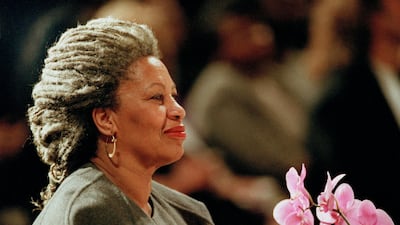Toni Morrison is the one of the great contemporary analysts of race and identity. In The Bluest Eye, her debut novel of 1970, she introduced us to the lives of the members of a poor black family in 1940s Ohio, to address the pernicious phenomenon of racial self-loathing.
Almost 30 years later, in her stark novel Paradise (1997), she turned to consider the ways in which the cultural politics of the late 1970s were inflected by the language and "theory" of racial superiority. And in God Help the Child (2015), Morrison's most recent work of full-length fiction, she set herself the task of imagining the ways in which inter-generational love and an understanding of others can be thwarted by the forms of triumphalism and deception that arise from the lure of "colourism".
These themes have also dominated Morrison's non-fictional endeavours. She once argued for the desegregation of the American canon, and in Playing in the Dark: Whiteness and the Literary Imagination (1992), she advanced the proposition that her country's literary tradition was not – as it had been made to look – naturally and necessarily white, but sculpted to appear that way. Why? To free her nation's cultural history from the supposed taint of darkness.
This sanitising and self-deceiving impulse was, Morrison held, not merely detrimental to those with dark skin: it was a “savage” way of approaching literary history that was ruining the intellectual, mental and moral health of the entire populace. The chimaera of whiteness was “an inhuman idea”.
Morrison's new volume of non-fiction, The Origin of Others, marks a continuation of her preoccupation with such matters. Only, here she develops in a more concerted way than we find in her earlier work the means by which racist ideologies obliterate the possibility of knowing others, and stifle the chance we are afforded to gain knowledge of ourselves.
What, she asks, are the modes of inherited thought by which we come to categorise people as fellows or aliens? What is at stake; what cultural mechanisms are at work, when we consign other humans to the de-humanising realm of the "other"? In pursuing this project, which grew out of a series of lectures at Harvard University last year, Morrison draws on a series of episodes from her country's literature and history, and examines them in relation to salient moments from her own life. The resulting work is transformative, exhilarating, distressing. And acutely and urgently necessary.
We begin in Ohio in the 1930s, with a vignette of Morrison's childhood, in which she recalls being visited by her formidable, imposingly authoritative great-grandmother Millicent MacTeer – a figure regarded as the "wise, unquestionable, majestic head of our family", who is blessed with the unassailable credential of being "tar black". On her arrival at the family home, MacTeer brandishes a cane at Morrison and her sister, each of comparatively pale skin, and declares that the girls have been "tampered with".
Morrison soon senses the weight of the denunciation: "It became clear that 'tampered with' meant lesser, if not completely other." With this formative experience in place, Morrison moves elegantly into a consideration of the long history of humanity's "tendency to separate and judge those not in our clan as the enemy, as the vulnerable and deficient needing control". From this assumed unruliness, it follows that those who are defined as "other" must be owned and tamed as slaves if they are to behave morally. Many analyses of the pseudo-logic of slavery stop here. But with characteristic dialectical curiosity, Morrison goes further. What, she asks, has the practice of slavery done humanly to slave owners? How did they neutralise the cognitive dissonance it inevitably engendered? One approach, she says, was to temper "slavery's degradation" with the judicious application of "brute force"; another was "to romance it".
Morrison then offers a riveting – and chilling – analysis of the ways in which black people have been mythologised by their abusers as naturally servile, accommodating, and possessed of a desire to be governed and to please. Later in the book, this subtle appreciation of the psychological perversions of race-based thought is brought to bear on the experience of slaves themselves (specifically on the terrible and numerous instances of those who come to love their owners); on the many ways in which the experience of slave owning drives those who do so to perform increasingly extravagant acts of sadism; and on the ways in which the alienating of slaves informs “a desperate attempt to confirm one’s own self as normal”.
As she puts it, brilliantly, elsewhere: “The sensibility of slave owners is gothic. It’s as though they are shouting: ‘I am not a beast! … I torture the helpless to prove I am not weak.’ The danger of sympathising with the stranger is the possibility of becoming a stranger.”
The cost of this mentality is, for Morrison, profoundly destructive, not only to the lives of the owned and the imprisoned, but also to all. Because, in reality, "there are no strangers. There are only versions of ourselves, many of which we have not embraced, most of which we wish to protect ourselves from". Alienating and brutalising others, on this analysis, means estranging and brutalising ourselves.
The Origin of Others is full of such insights. They are made all the more persuasive by Morrison's elegant, plangent prose, and by her refusal to exclude herself from those mythologies of otherness of which we are all the unhappy legatees. To read this wise, probing and inspiring book is to acquaint yourself with a writer who is a foe of that inheritance and a vital friend of the human project: "To remain human – and to block the dehumanisation and the estrangement of others."
_______________
Read more:
Irvine Welsh says dance music is the rhythm behind his novels
Book review: Iris Origo's A Chill in the Air proves strikingly attentive
Exiled Arab writers abroad reflect on the price of creative freedom
_______________

